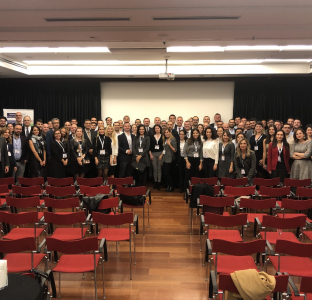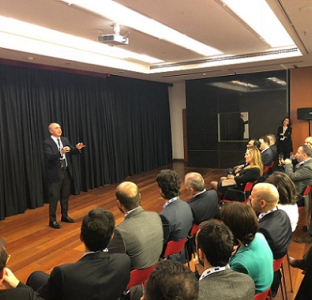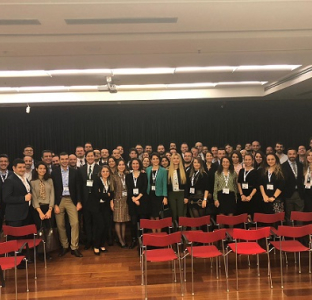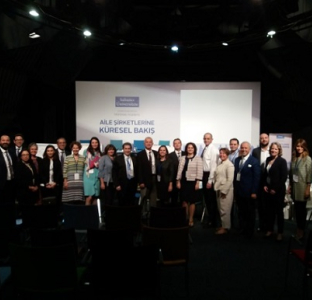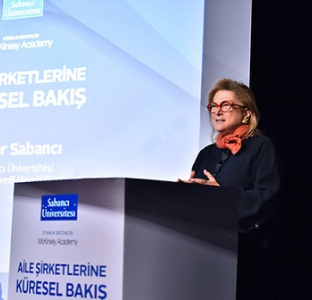Seminars and Conferences
| Seminar Date | Speakers | Speaker's Institution | Seminar Title | Organizer |
|---|---|---|---|---|
| 03.07.2025 | Jongwon Park | Korea University | The Impact of A Horizontal Versus Vertical Product Display On The Attraction Effect | İpek Nibat |
| 22.03.2025 | Sunay Mutlu | Kennesaw State University | Supplier Financing Agreements and Cash Flow Management | Aziz Şimşir |
| 12.03.2025 | Ceren Altuntaş Vural | Chalmers University of Technology | Facilitating continuous resource flows through circular logistics services | Melek Akın Ateş |
| 03.03.2025 | Fulya Açıkgöz | University of Sussex Business School | Aligning Checkout Technologies with Shopping Motivations: Understanding Service Demotion and Customer Revenge | Cenk Koçaş |
| 06.01.2025 | Güner Velioğlu | Loyola University Chicago | Are ESG ratings relevant? Evidence from dividend cuts | Aziz Şimşir |
| 11.12.2024 | Zeynep Aydın Gökgöz | Sabancı Üniversitesi | What is Next? Exploring the Dynamics of TV Series’ Success | Zeynep Karagür |
| 04.11.2024 | Mina Beigi | University of Southampton | What Do We Know about Minority Groups’ Career Success? | Nüfer Yasin Ateş |
| 30.09.2024 | Oğuz Gencay | University of Maryland | Jazzing through task uncertainty: The improvisation mindset, appraisals, and performance in uncertain tasks | Nüfer Yasin Ateş |
| 10.07.2024 | Onur Tosun | Cardiff University | Unintended Consequences of “The Plan For Growth”: Earnings Management in the UK | Aziz Şimşir |
| 04.07.2024 | Celile Itır Göğüş | Sabancı University | The Role of Goal Setting and Sustainability Logic in Operations Decision-Making: A Multi-Method Investigation | |
| 02.07.2024 | Altuğ Tanaltay | Sabancı University | Decoding Digital Engagement | |
| 20.05.2024 | Matti Keloharju | Aalto University | Value-Driven Bankers and the Granting of Credit to Green Firms | Bünyamin Önal |
| 28.03.2024 | Remzi Gözübüyük | Sabancı University | About the role of psychopathic tendency of the CEOs in the risk taking behavior of the companies. | |
| 01.04.2024 | Panagiotis Koutroumpis | University of Sussex | CEO Political Ideology and the Pandemic: The Difficult Choice Between Downsizing and Lower Dividends | Bünyamin Önal |
| 14.03.2024 | Jan Klostermann | Köln University | The Effect of Company Size on aggregate Word−of−mouth valence | Zeynep Karagür |
| 06.03.2024 | Seçkin Özkul | University of South Florida | Green Horizons: Shaping the Next Generation of Supply Chains | Can Aktan |
| 22.02.2024 | Ozan Duygulu | Sabancı University | UN Sustainable Development Goals | |
| 21.02.2024 | Ayşe Kocabıyıkoğlu | Sabancı University | Nudging For Sustainability in Supplier-Retailer Negotiations and Role of Goal Setting and Sustainability Logic in Operations Decision Making: A Multi-Method Investigation | |
| 01.02.2024 | Jiyuan Huang | University of Zurich | Difference-in-Differences with Economic Factors and the Case of Housing Factors | Yiğit Atılgan |
| 17.01.2024 | Barış İnce | University of College Dublin | More Robots Less Cost of Equity | Yiğit Atılgan |
| 16.01.2024 | Ronan de Kervenoael | Rennes School of Business | Consumers’ perceived value of Social IoT based online community: investigating social awareness processes surrounding smart kitchen robot appliances | Nihat Kasap |
| 28.12.2023 | Dan Medvedev | University of Chicago's Booth Business School | Monetary and Psychological Incentives Across Cultures | Arzu Wasti |
| 20.12.2023 | Zeynep Karagür | Sabancı University | Brand Measures United – Why and When Survey-based Brand Measures Still Matter for Brand Performance Management | |
| 15.12.2023 | Thomas Spengler | TU Braunschweig | Towards Sustainable Battery Production Systems and Supply Chains | Tevhide Altekin |
| 27.11.2023 | Nicole F. Richter | University of Southern Denmark | Cultural intelligence in global virtual teams (GVT): a should-have and/ or must-have factor? | Nüfer Yasin Ateş |
| 02.11.2023 | M. Berk Talay | University of Massachusetts | Launching New Products During Recessions: Insights from the U.K. FMCG and U.S. Automobile Industries | Nihat Kasap |
| 26.10.2023 | Aidin Namin | Loyola Marymount University | The Unanticipated Dynamics of Promoting Crowdfunding Donation Campaigns on Social Media | Barış Erman Depecik |
| 27.10.2023 | Alaa Alhaj Ismail | Coventry University | Does Age Similarity Between Audit Committee Chair and Engagement Partner Affect Audit Quality? | Ulf Nilsson |
| 22.12.2022 | Ezgi Özgen | Koç University | The Mindless Artist: How do people evaluate art made by a machine? | Zeynep Aydın Gökgöz |
| 14.12.2022 | İpek Nur Nibat Cayrol | Grenoble École de Management & USMB | Fake News Denigrating Firms: Fact-Checking is Dead, Long Live Fact-Checking! | Zeynep Aydın Gökgöz |
| 07.12.2022 | Svetlana Tokareva | University of Memphis | A review of more than three decades of academic research on brand extensions: A bibliometric approach | Zeynep Aydın Gökgöz |
| 01.12.2022 | Aynur Nabiyeva | University of Massachusetts | CSR Transparency Among Small Firms: Evidence from Benefit Corporations | Nüfer Yasin Ateş |
| 28.11.2022 | Shahab Zare | IMT School for Advanced Studies Lucca | Does Knowledge Complementarity Always Pay Back? Comparing Academic, Employee, and User Knowledge Sources in a Crowdfunding Setting | Nüfer Yasin Ateş |
| 24.11.2022 | Amr El-Kebbi | McMaster University | Let There Be Light: The Emergence of Entrepreneurial Identity among Entrepreneurship Students | Nüfer Yasin Ateş |
| 23.11.2022 | Tung, Yi Cheong Eugene | Singapore Management University | An Arc of Neoliberalism: Boards’ Responses to Explicitization of Governance in Europe | Nüfer Yasin Ateş |
| 23.11.2022 | Samuel Sekar | University of South Florida | Spillover Effects in Product Customization | Zeynep Aydın Gökgöz |
| 21.11.2022 | Stoyan Sgourev | ESSEC Business School | Breaking Rank: Valuation Arbitrage in Destigmatization | Nüfer Yasin Ateş |
| 17.11.2022 | Umair Usman | University of Kentucky | Blockchain Augmented Marketing Claims: Evidence for Enhanced Legitimacy and Preference versus Traditional Practices | Zeynep Aydın Gökgöz |
| 09.11.2022 | Zeynep Karagür | University of Cologne | Dynamics of brand relevance in category – An analysis of macroeconomic and product-market factors | Zeynep Aydın Gökgöz |
| 16.03.2022 | Orkun Saka | University of London | Epidemic Exposure, Fintech Adoption, and the Digital Divide | Ata Can Bertay |
| 07.03.2022 | Peren Özturan | Ozyegin University | A Tale of Two Worlds: Marketing-R&D Integration in New Product Development | Zeynep Aydın Gökgöz |
| 03.11.2021 | Öykü Arkan Tunç | Rutgers Business School | The Competing Virtues of Loyalty and Courage: When Ethical Climate Does Not Lead to Whistleblowing | Nüfer Yasin Ateş |
| 01.11.2021 | Jomel Ng Wei Xuan | National University of Singapore | Opposing effects of proactive followership on empowering leadership: A within-dyadic analysis | Nüfer Yasin Ateş |
| 28.10.2021 | Melis Ceylan | Bilkent University | The importance of impression management concerns during food choice | Zeynep Aydın Gökgöz |
| 26.10.2021 | Bina Ajay | University of Cincinnati | A Love-Hate Relationship: CEO Emotivity and its Implications for CEOs and Their Firms | Nüfer Yasin Ateş |
| 21.10.2021 | İrem Yörük | Wayne State University | The impacts of psychographic changes on consumers’ purchase decisions | Zeynep Aydın Gökgöz |
| 20.10.2021 | Gizem Ceylan | University of Southern California | More Pictures, More Words: Choosing Redundancy in Visual-Verbal Communication | Zeynep Aydın Gökgöz |
| 19.10.2021 | Yasaman Gorji | Concordia University | Celebrity Couples as Business Families: A Social Network Perspective | Nüfer Yasin Ateş |
| 14.10.2021 | Aras Can Aktan | Bocconi University | Chief Innovation Officers: An empirical study of behavioral and institutional antecedents | Nüfer Yasin Ateş |
| 14.02.2020 | S. Mehmet Özsoy | Ozyegin University | Jump Risk in International Equity Indices | Tolga Demir |
| 06.02.2020 | Rasim Serdar Kurdoğlu | Bilkent University | Arguing to Defeat Rather Than to Reason:Reign of Irrationality by Eristic Arguments | Nihat Kasap |
| 08.01.2020 | Yasin Rofcanin | University of Bath, UK | Co-worker support or good relations with managers? A weekly diary study on i-deals | |
| 25.12.2019 | Baler Bilgin | Koç University | Perceived Essence Can Slow Hedonic Decline by Enabling Meaning Making | |
| 24.12.2019 | Özge Sürer | Northwestern University | Coefficient tree regression: Fast, accurate and interpretable predictive modeling | |
| 24.12.2019 | Nazlı Gürdamar | London Business School | Doing More Good: On the Process of Constructing Budgets for Charitable Giving | |
| 19.12.2019 | Enes Eryaysoy | İstanbul Şehir University | The wisdom of-blind-crowds:Can herding behaviour really impede recommender systems’ performances? | |
| 22.11.2019 | Jingxian Yao | National University of Singapore Business School | The Implications of Voice Behaviour on Leaders and Voicing Employees | |
| 07.10.2019 | Shameek Sinha | E Business School -Madrid | Predicting Behaviour of Current and Future Donors | |
| 27.09.2019 | Mustafa Karataş | Koç University | Feast or Famine?” The Impact of Vice Magnitude on the Attractiveness of Vice-Virtue Bundles | |
| 12.09.2019 | Jane Maley | Macquarie University-Sydney | My Research past,present and future | |
| 24.04.2019 | Uğur Uygur | Loyola College Chicago | Cognitive origins of New Venture Creation: How knowledge drives Entrepreneurial Action | |
| 08.02.2019 | Melek Akın Ateş | Middle East Technical University (METU) | Order From Chaos: A Meta Analytic approach to supply chain complexity | |
| 04.02.2019 | Bünyamin Önal | Aalto University | Political (dis)connections and corporate investment decisions: Evidence from China | |
| 04.02.2019 | Kerem Kılıç | HEC Paris,France | Relative Performance Evaluation and Overconfident CEOs | |
| 21.01.2019 | Barış İnce | Koç University | How Do Regulatory Costs Affect M&A Decisions and Outcomes? | |
| 14.01.2019 | Ata Can Bertay | World Bank | Leverage, Bank Employee, Compensation and Institutions | |
| 19.12.2018 | Selman Erol | Tepper School of Business,Carnegie Mellon University | Network Hazard & Bailouts | |
| 18.12.2018 | Barış Depecik | Bilkent University | Who Benefits from Brand Exits? | |
| 12.12.2018 | Berk Ataman | Koç University | Marketing's impact on and through the consumer decision journey | |
| 11.12.2018 | Nükhet Harmancıoğlu | Koç University | Short- and Long-term market returns of International New product codevelopment alliances | |
| 04.12.2018 | Nejat Seyhun | University of Michigan | Do Insiders Exploit Anomalies? |
| Year | Event Name | Date / Location | Speakers / Participants | Summary |
|---|---|---|---|---|
| 2025 | Finance Workshop | Sabancı University Minerva Han | Kai Li, Julian Koelbel, Vesa Pursiainen, Emirhan İlhan, Jeong Ho Kim | Expert speakers discussed sustainable finance from various perspectives. |
| 2025 | BizBizze Association ARAMA Conference | Sabancı University Altunizade Digital Campus | BizBizze Association for Supporting Women’s Ideas | Reviewed BizBizze’s roadmap for empowering women through entrepreneurship and education. |
| 2025 | Disaster Preparedness Workshop | Sabancı University Performing Arts Center | Haluk Özener, Nasuh Mahruki, Sibel Salman, Selçuk Tütüncü, Melsen Tunca | Shared knowledge on disaster relief coordination, logistics, and preparedness. |
| 2025 | JMS Paper Development Workshop | Sabancı University School of Management | Yasin Rofcanin, Chidiebere Ogbonnaya, Corinne Post, Melek Akın Ateş | JMS editors guided participants through academic publishing and writing quality research. |
| 2025 | JPSM Paper Development Workshop | Sabancı University School of Management | Carmela Di Mauro, Steven Carnovale, Leonardo Marques | JPSM editors provided publishing guidance and research quality expectations. |
| 2025 | Journal of Business Research Workshop | Sabancı University School of Management | Mariano Pitosh Heyden | JBR editor discussed academic publishing and developing quality research. |
| 2024 | Business Analytics Workshop | Sabancı University Performing Arts Center | Cihan Altay, Ezgi Akpınar, İlknur Köksal Bektaş, Orkun Kılıçlıoğlu, Onur Varol, Ömer Barbaros Yiş, Ömer Faruk Çelebi, Özgür Özlük | Explored business analytics and AI applications. |
| 2024 | Sustainability in Finance Workshop | Sabancı University Minerva Han | Henri Servaes, Grigory Vilkov, Philipp Krueger, Ata Can Bertay | Discussed ESG factors, climate risk pricing, and business implications. |
| 2024 | Workplace Policies on Domestic Violence ARAMA Conference | Sabancı University Minerva Han | mART students, BADV Project Members | Addressed development of workplace policies against domestic violence and leadership strategies. |
| 2024 | 2nd Sustainability Transformation Summit | Sabancı University Minerva Han | Ebru Taşçıoğlu, Ozan Duygulu, Oğuz Babüroğlu | Focused on holistic approaches to corporate sustainability. |
| 2024 | Sustainability at the Crossroads: What’s Next? | Sakıp Sabancı Museum | Cevdet Alemdar, Remzi Gözübüyük, Jonathan Doh, Rodolphe Durand, Olga Hawn, Jasjit Singh, Murat Tarakçı, Tankut Turnaoğlu, Cahit Erdoğan, Cenk Koçdor, Alvaro Cuervo-Cazurra, Sinziana Dorobantu, Elif Seçgin, Irina Surdu-Nardella, Mehmet Üvez, Özlem Ünlüer, Ata Can Bertay, Pınar Akçayöz De Neve, Gamze Gökçen Pilevne, Dicle Kocaoğlu, Giulio Nardella, Derya Özet Yalgı, Nüfer Yasin Ateş | Multidisciplinary discussion on sustainability in academia and business. |
| 2024 | Impact-Oriented Entrepreneurship & Product Development Workshop | Sabancı University | Dyson, Onaranlar Kulübü | Focused on sustainable and socially impactful product development processes. |
| 2023 | Sustainability and Green Deal Practices Meeting | SabancıDX Hangar | Danilo R. Streck (UNESCO) | Knowledge-sharing on sustainability from experts and practitioners. |
| 2022 | 6th Int. Journal of Action Research Symposium | Sabancı University | Miren Larrea, Oğuz Babüroğlu, Isabel Heck, Janie Houle, Grégoire Autin, James Karlsen, Marria Hassan, Zeynep Gülru Göker, Olav Eikeland, Mooken Malida, Lonnie Rowell, Ruth Balogh, Carmen Martinez Vargas, Erik Lindhult, Pınar Akpınar | Discussed theory and practice of action research through a multidisciplinary lens. |
| 2019 | Graduate Alumni Event | Sakıp Sabancı Museum | Cenk Alper (Board Member and CEO of Sabancı Holding) | An event where Cenk Alper, Board Member and CEO of Sabancı Holding, shared his experiences on "Becoming a Leader". It brought together alumni and current students from Executive MBA, Full-time MBA, Finance Master's, PhD, Business Analytics Master's, and MBA for Professionals programs. The event concluded with inspiring discussions and networking opportunities. |
| 2018 | Graduate Alumni Meeting | Tuesday, November 20, Sakıp Sabancı Museum | Şerif Kaynar (Honorary Chairman of Korn Ferry Turkey) | Şerif Kaynar, honorary chairman of Korn Ferry Turkey, shared his insights with alumni on important topics such as the significance of evaluating career opportunities and the concept of networking in business life. |
| 2017 | Graduate Alumni Meeting | Thursday, November 23, Sakıp Sabancı Museum | Canan Özsoy (CEO of General Electric Turkey) | Canan Özsoy, CEO of General Electric Turkey, shared her knowledge on change, innovation, globalization, and the Turkish economy with young professionals working in various sectors of the business world. |
| 2017 | Business Analytics Workshop | Friday, October 13, 2017, Cinema Hall | Opening Speech: Füsun Ülengin (Sabancı University School of Management) Keynote Speaker: Gül Ege (SAS Advanced Analytics R&D Senior Director) Session Speakers: Mustafa Gökçe Baydoğan, Barış Depecik, Birol Yüceoğlu, Cem İyigün, Deniz Yenigün, Ece Egemen, Gökhan Göktürk, Kemal Kılıç, Mehmet Gönen, Enis Kayış | Sabancı University School of Management hosted the first Business Analytics Workshop. The workshop analyzed the use of business analytics in different sectors and the application of new methods. Sessions on Marketing Analytics, New Methods, and Healthcare Applications in Analytics were held. A poster presentation competition for graduate students also took place. |
| 2017 | Global Perspectives on Family Businesses Conference | Wednesday, October 4, 2017, Sakıp Sabancı Museum the Seed | Opening Speeches: Güler Sabancı, Füsun Ülengin Moderators: Melsa Ararat, Ali Çağatay, Arzu Maliki Panelists: Patricia Angus, Amadeo Di Lodovico, Leyla Alaton, Sumer Tömek Bayındır, Tayfun Bayazıt, Murat Özyeğin, Ebru Özdemir, Alp Öğücü | Organized in collaboration with McKinsey Academy and Columbia Business School, the conference offered a global perspective on family businesses. It addressed the challenges faced by Turkish family businesses on their path to institutionalization and the expectations of subsequent generations. Panels included "European and Eurasian Perspectives," "Family Businesses in Turkey," and "Expectations of the Next Generation." |
| 2016 | 24th National Management and Organization Congress | May 29-31, 2016 (May 28 Young Academics Workshops) | Prof. Dr. Yılmaz Esmer, Prof. Dr. Gürol Irzık, and 347 academics | The congress, attended by 347 academics from 99 different institutions and featuring 119 scientific presentations, was a significant national gathering in the field of Management and Organization in Turkey. Workshops for young academics were also organized. |
| 2015 | Unilever Global CEO Paul Polman Conference: "Creating a Better Future Everyday Made By You" | Date Unknown | Paul Polman (Unilever Global CEO) Hosts: Güler Sabancı, Prof. Dr. Nihat Berker, Prof. Dr. Füsun Ülengin | Unilever Global CEO Paul Polman spoke about sustainability, the transformation of capitalism, and the responsibility of creating a better world. Sabancı University's leadership in sustainability was highlighted. |
| 2010 | "Global Leaders in Management" series: Muhammad Yunus Conference - "Economic Turmoil and the Importance of Social Entrepreneurship" | Thursday, December 15, Sabancı University Tuzla Campus | Prof. Muhammad Yunus (2006 Nobel Peace Prize Laureate) Hosts: Güler Sabancı, Prof. Nakiye Boyacıgiller | Prof. Muhammad Yunus, laureate of the 2006 Nobel Peace Prize for his microcredit initiatives, detailed the microcredit system he established in Bangladesh and emphasized the importance of social entrepreneurship. |
| 2012 | Sabancı University Presented Turkey's Hidden Champions in Vienna | Within the scope of Global Entrepreneurship Week, Vienna | Dilek Çetindamar, Türkan Yosun, Nadya Zhexembayeva | The results of a study on "hidden champions" – Turkish companies operating in international markets that are among the top three in their respective sectors but not widely known to the public – were presented. 10 Turkish companies were featured. |
| 2011 | "Global Leaders in Management" series: The Coca-Cola Company Chairman and CEO Muhtar Kent Conference | Monday, October 3, Sabancı University Tuzla Campus | Muhtar Kent (Chairman and CEO of The Coca-Cola Company) Hosts: Prof. Dr. Nakiye Boyacıgiller, Güler Sabancı, Prof. Dr. Nihat Berker | Muhtar Kent addressed topics such as globalization, the changing role of the private sector, new rules of competition, and how globalization trends should influence young people's future plans. He also discussed Coca-Cola's initiatives on gender equality and women's empowerment. |
| 2011 | 21st European Summer School on Technology Management for PhD Students | September 5-9, 2011, Sabancı University Karaköy Communication Center | Prof. Dr. Nakiye Boyacıgiller, Prof. Holler Ernest, Prof. Dilek Çetindamar, Dr. Özgecan Koçak, İffet İyigün Meydanlı, Jan Kratzer, Max von Zedtwitz, Jeff Butler, Jonathan Linton | Supported by TÜBİTAK, the Summer School brought together leading academics and PhD students from Turkey and Europe. Topics covered included R&D, patent integration, technology management practices, technological competencies, and innovation. |
| 2011 | Emerging Markets Corporate Governance Research Network (EMCGN) 3rd Conference Series (Supported by Sabancı University Corporate Governance Forum (CGFT)) | May 28-29, 2011, Seoul, South Korea | Two papers accepted from Sabancı University members. | The third conference series organized by EMCGN was supported by the Corporate Governance Forum. Research on corporate governance in emerging markets was shared. |
| 2010 | International Social Entrepreneurship Conference: "Social Entrepreneurship for Change" | June 4-5, 2010 | 240 participants from 19 different countries | Organized by INSEAD and Sabancı University, the conference brought a global and local perspective to social entrepreneurship. |
| 2009 | Changing Universities: Governance, Relevance, Performance | October 2009 | 70 participants from 14 countries | Organized within the scope of the project for developing civil society dialogue, sponsored by the European Union, in collaboration with Oxford, Uppsala, and Siena Universities. |
| International Entrepreneurship Forum | September 2009 | 100 participants from 22 countries | Organized in collaboration with Essex University, the International Innovation Initiative, and OECD. | |
| International Organization Network | May 2009 | 40 participants from 10 countries | Organized in collaboration with Koç University. | |
| Mathematical Finance Istanbul Workshop | May 18-21, 2009 | 70 participants | Took place under the sponsorship of the European Research Council. | |
| Odysseus 2009 - 4th International Freight Transportation and Logistics Workshop | May 2009 | 160 participants from 15 countries | Organized in collaboration with Koç, Bilkent, Doğuş, METU, and Boğaziçi Universities. | |
| 2007 | CEEMAN 15th Anniversary Conference: "Globalization and its Impact on Management Sciences" | September 27-29, 2007 | Prof. Chan Kim, Muhtar Kent, Dr. Ichak Adizes, Jean-Pierre Lehmann, Henryka Bochniarz Hosts: Prof. Nakiye Avdan Boyacıgiller | Brought together approximately 150 rectors and deans from universities and management science organizations in Central and Eastern Europe to Istanbul for the first time. The conference discussed the effects of globalization on management sciences and leadership qualities. |
